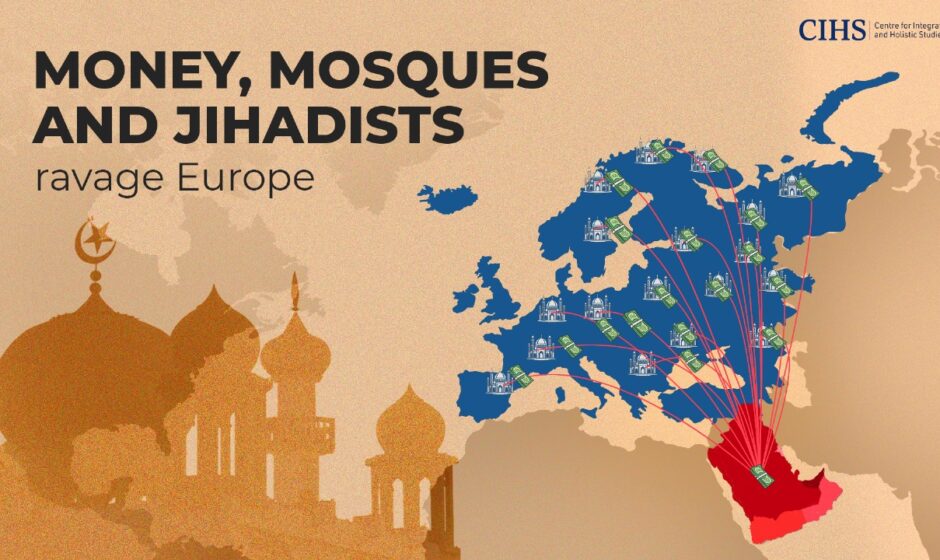Unregulated foreign funding to religious extremist organizations has led to spread of Jihadists that altered demography, threaten democracy, social fabric.
Rohan Giri
First, it was United States and United Kingdom that reported increasing presence of Islamist networks, their infiltration into public institutions and society. Now, it’s the turn of Europe to confront a comparable proliferation of jihadist ecosystem that has led to demographic transformation, threat to democracy and socio-economic fabric in the region,

Substantive support from Gulf monarchies, Turkey and Iran apart from others has enabled spread of jihadist networks through religious centres, cropping up of ideological organizations and expansion of their financial networks that bolstered subversive narratives.
Although religious pluralism is easily recognized as a fundamental right, unregulated influence of foreign entities has generated significant concerns regarding integration, social cohesion and security.
Saudi Arabia has reportedly been an important financial catalyst for the difficulties confronting Europe. During 2010 – 20, Riyadh disbursed more than $1.3 billion to Islamist groups in Europe via Muslim World League and International Islamic Relief Organisation.
These funds have facilitated setting up Wahhabi-affiliated religious infrastructure, exemplified by Grand Mosque of Brussels. The mosque, seized by Belgian authorities in 2018 had historically served as a hub for ideological influence. In France, Germany and UK, institutions funded by Saudi Arabia have influenced religious discourse, frequently deterring assimilation into local cultures.
Qatar has taken an alternative approach, leveraging considerable financial resources to endorse organizations that align with its geopolitical ambitions. During 2014 – 21, more than $ 650 million was allocated to European mosques, NGOs and Islamist networks through Qatar Charity and Qatar Foundation.
A 2019 report explained how Qatari financing supported Muslim Brotherhood’s operations in Europe with monetary transfers channeled through intricate networks. Institutions including East London Mosque, Finsbury Park Mosque and Cordoba Foundation have received Qatari support, promoting narratives that highlight social segregation. In France, localities such as Trappes have seen rise of insular enclaves, partially influenced by Qatari-funded efforts that promote parallel social and economic frameworks.
Turkey wields its influence via direct governmental intervention. Directorate of Religious Affairs, known as Diyanet supervises over 900 mosques in Germany controlling religious discourse and appointing imams who disseminate Ankara’s political and religious ideologies.
German intelligence agencies have voiced apprehension regarding Turkey’s increasing influence especially since President Erdogan has urged Turkish populations in Europe to oppose integration. The Turkish-supported Milli Görüş movement, operating throughout Western Europe, promotes an Islamist socio-political paradigm that contests European secular principles.
The 2016 Berlin Christmas Market incident underscored the threat of radicalisation within networks shaped by foreign-controlled religious entities.
Iran uses a more nuanced, yet consequential, strategy. Tehran has expanded its influence in Shia communities in the UK, Sweden, and Germany through AhlulBayt World Assembly and Al-Mustafa International University. Financial networks associated with Hezbollah that frequently masquerade as charitable organizations have enabled both ideological proliferation and remittance of funds to Middle East. British intelligence agencies have recognized Hezbollah’s financial operations as a security threat; yet these activities continue to operate under legal safeguards intended for religious entities.
In addition to conventional religious financing, financial instruments like Islamic banking and microfinance have been critical in supporting these networks. Islamic Relief Worldwide, active throughout Europe, has acquired a million dollars in donations from the Gulf in the past ten years. Despite framing these donations as humanitarian assistance, a significant portion of the funding serves to bolster ideological influence and establish economic dependency.
Qatar Charity’s microfinance projects in France and Belgium have cultivated insular economic systems, wherein enterprises adhering to particular ideological stances prosper, while broader integration into the European market is impeded.
Involvement of mosque networks in funding extremist groups has garnered heightened attention. Europol and intelligence services have disclosed instances in which foreign-funded mosques in France, Belgium, and Germany have served as channels for terrorist financing.
A 2023 Europol report indicated that a minimum of 20 European mosques received funding and were subsequently associated with radical organisations in Middle East. In 2017, German police closed the Berlin Fussilet Mosque upon uncovering its connections to perpetrator of Berlin Christmas Market incident. France has implemented the same actions, shuttered 89 mosques during 2020 – 23, accommodating extremist factions and facilitating financial transactions for jihadist organizations.
Security ramifications of these advances are significant. Extremist networks, developed and shaped by foreign financing, were linked to 2015 Charlie Hebdo attack, 2017 Manchester Arena bombing and 2020 Vienna terrorist attack. Certain European governments have implemented resolute measures. In 2021, Austria, led by Chancellor Sebastian Kurz, initiated closure of mosques directly associated with funding from Turkey and Gulf nations. France’s anti-separatism law, implemented the same year, established rigorous transparency mandates for foreign-funded religious organizations with an objective of diminishing external ideological influence.
These efforts notwithstanding, Europe’s comprehensive response remains fragmented. Germany persists in permitting Turkish-controlled religious institutions to function with minimal supervision. UK has not yet implemented effective measures against Qatari-supported organisations, despite evidence linking them to terrorist ideologies. Despite being comprehensive, European Union’s counter-terrorism measures have encountered difficulties in combating ideological infiltration within communities.
Resultant demographic changes and the impact on democracy are seriously being debated in Europe. Muslim population in Europe, currently estimated at 44 million, is anticipated to increase to 76 million by 2050. Migration and demographic changes are the elements of societal wellbeing; nonetheless, the inability to facilitate integration and mitigate foreign ideological influence threatens to exacerbate societal divisions.
Reports of concurrent legal systems, voluntary segregation, and growing establishment of localised religious administration in regions of France, Belgium, Sweden and Germany signify an issue that transcends security and social stability.
Europe may have to embrace a proactive strategy moving forward. Enhanced transparency in foreign fund raising is crucial along with stringent implementation of regulations aimed at preventing external influence from compromising national unity.
De-radicalization initiatives must be enhanced by prioritizing community-driven efforts that promote common values instead of exacerbating differences. Safeguarding of Europe’s democratic, secular and inclusive identity will hinge on policymakers’ readiness to address these problems with a measured yet resolute approach.
If ignored, the impact of foreign-funded Islamist networks would persist in expanding, altering European societies in ways that undermine the region’s fundamental values. This issue pertains not only to security but also to preservation of long-term stability and unity of European states.
Choices made today will shape future of Europe, necessitating attention, decisive action and a dedication to preserving principles foundational to contemporary European communities.
(Rohan is a doctoral fellow at Amity University in Gwalior, content head at Centre for Integrated and Holistic Studies)
References:
1. https://www.youtube.com/watch?v=d18oSjMDHh8
4. https://cihs.blog/2025/01/08/islamist-jihad-threat-to-humanity/
5. Chesnot, C., & Malbrunot, G. (2019). Qatar papers. Michel Lafon.
6.https://en.apa.az/religion/france-closed-89-mosques-since-2020-anas-398815?utm_source=chatgpt.com



